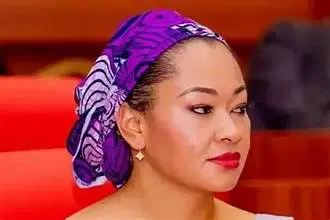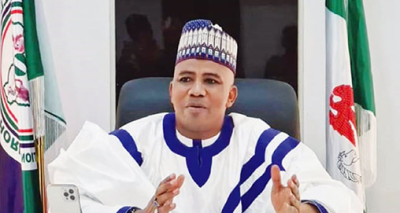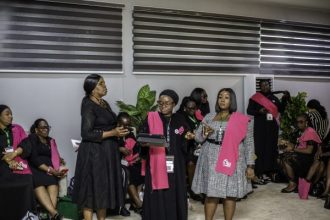There was palpable tension and heated drama in the Senate chamber on Tuesday as Senate President Godswill Akpabio and Senator Natasha Akpoti-Uduaghan (Kogi Central) clashed during deliberations on the Criminal Code Amendment Bill, which seeks to increase penalties for persons involved in procuring or facilitating abortions.
The bill, which was presented for concurrence by the Senate Leader, Opeyemi Bamidele (Ekiti Central), proposes a 10-year jail term without an option of fine for anyone who supplies drugs or instruments used in carrying out abortions — an amendment from the current three-year sentence stipulated under the existing Criminal Code Act.
According to the bill’s sponsors, the proposed amendment is intended to align Nigeria’s criminal legislation with what they described as the nation’s “evolving social, moral, and medical realities.” However, the debate quickly exposed deep divisions among lawmakers over the moral, legal, and health implications of the proposal.
Senators Split Over Scope of “Unlawful Abortion”
As deliberations commenced, several senators expressed conflicting views on the proposed stiff penalties.

Senator Saliu Mustapha (Kwara Central) argued that not all abortions should be viewed through a criminal lens, especially when carried out to save the life of a woman or due to severe medical complications. He urged the Senate to adopt a balanced approach that reflects both moral and humanitarian considerations.
“Abortion, while often seen as morally wrong, can be medically necessary in certain life-threatening situations,” Mustapha said. “We must avoid blanket criminalisation that could endanger women’s lives and criminalise doctors performing life-saving procedures.”
Similarly, Senator Abdul Ningi (Bauchi Central) raised concerns that the proposed amendment could have unintended consequences for the medical community. He warned that it might discourage doctors from providing essential medical advice or interventions for fear of prosecution.
He said, “This bill, if passed in its current form, may push many medical practitioners into silence, creating a dangerous situation where women in distress cannot access safe and informed care. I suggest the bill be stepped down for wider consultations, especially with medical and religious stakeholders.”
Akpabio Orders Suspension and Committee Review
Following the intense back-and-forth among senators, Senate President Godswill Akpabio intervened to restore order. Acknowledging the contentious nature of the bill, he ruled that further deliberation should be suspended pending a detailed review by the Senate Committee on Judiciary, Human Rights and Legal Matters.

He directed the committee to “review the contentious provisions, consult relevant stakeholders, and report back within two weeks.”
The motion to suspend the debate was subsequently adopted through a voice vote, effectively ending the session’s consideration of the bill — at least temporarily.
Natasha’s Attempt to Speak Sparks Confrontation
Moments after Akpabio’s ruling and the gavel’s drop, Senator Natasha Akpoti-Uduaghan, who had been visibly eager to contribute to the debate, raised her hand and appealed to be recognised.
“Mr Senate President, please may I speak?” she asked. “I am a woman, and abortion has to do with women. It is very important, sir, that I make a contribution.”
Her plea, however, was met with resistance. Akpabio firmly maintained that the matter had already been “stepped down in totality,” and that Senate rules did not permit reopening a debate once the gavel had fallen.
At that point, Senator Adams Oshiomhole (Edo North) raised a point of order, warning against allowing exceptions to established parliamentary procedures.
“Mr President, if you grant the exemption to distinguished Senator Natasha, then you must extend the same to everyone. At the end, we shall have no rules left to guide us,” Oshiomhole said.
Akpabio concurred, citing Rule 52 (Subsection 6) of the Senate Standing Orders, which prohibits reopening a matter after a ruling has been made.
“I rule Senator Natasha out of order,” Akpabio declared, striking down her request to speak.
Natasha Expresses Disappointment
Following the plenary session, Senator Akpoti-Uduaghan expressed deep disappointment at being denied the opportunity to speak on a matter she described as “fundamentally about women’s rights and health.”
In an interview with TheCable, she said:
“I am disappointed I wasn’t allowed to speak about an issue that concerns women. I am a woman, a mother, and I feel like I should have been recognised to speak, especially as we were only two women in the Senate today during plenary — myself and Senator Banigo. My hand was up throughout the debate.”
She reaffirmed her commitment to advocating for women’s health and reproductive rights, adding that she would make her full contribution when the bill is revisited at the committee stage.
“I remain passionate about issues affecting women, and I will continue to ensure that our voices are heard during the committee’s review,” she added.
Senate Divided, Public Reactions Expected
The incident has sparked widespread conversation among political observers and gender rights advocates, who see the clash as a reflection of the Senate’s gender imbalance and the need for more inclusive legislative participation.
While some senators have praised Akpabio for upholding parliamentary procedure, others argue that he should have allowed Natasha a brief opportunity to speak, given the sensitive nature of the subject.
The Criminal Code Amendment Bill will now undergo further scrutiny by the Senate Committee on Judiciary, Human Rights and Legal Matters, which is expected to consult medical experts, religious leaders, and civil society organisations before presenting a report within two weeks.
As the debate resumes later, all eyes will be on how the Senate balances moral convictions, legal principles, and the urgent need to safeguard women’s health rights in Nigeria.
Read More:









